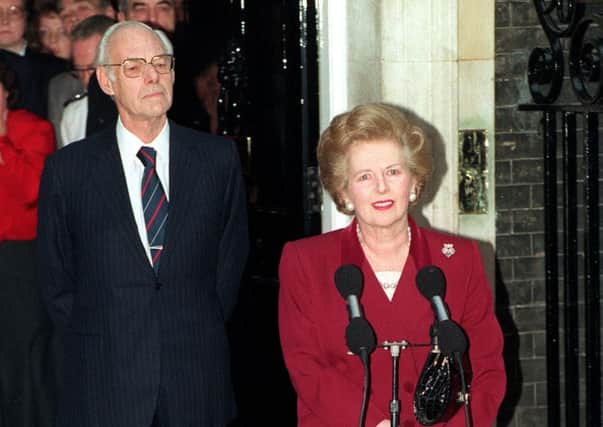Bernard Ingham: Mystery of Iron Lady’s refusal to ‘fight to win’


SURELY Sir Mark and Carol Thatcher should have offered their mother’s clothes to the Imperial War Museum rather than the Victoria and Albert. What is power dressing if not donning battledress and a handbag if not a guided missile?
Margaret Thatcher’s 11 years in No 10 were one long war as a woman and a provincial from “trade” against patronising elites whose only skill was in managing decline badly and getting the future wrong such as joining the European exchange rate mechanism.
Advertisement
Hide AdAdvertisement
Hide AdWhich brings me to the enduring mystery of her demise. Why didn’t she fight? She felt she still had much to do to improve Britain and that John Major was not ready to take over. But she told me: “I am not going to grub for votes in the gutter. If they don’t know who they are voting for by now, they never will.”
Some put that down to arrogance. I still see it as despair at having to fight on as colleagues resigned to spend more time with their families. Perhaps privately she had had enough. Denis Thatcher certainly thought so 18 months earlier when she completed 10 years in office.
One thing is clear: politicians are nothing if not self-centred when it comes to ambition and their prospects.
Let me remind you what Thatcher was grappling with as the Tory party’s leadership election got underway with Michael Heseltine’s nomination mid-November:
Preparation for war to get Saddam Hussein out of Kuwait;
The collapse of Communism and the end of the Cold War;
Advertisement
Hide AdAdvertisement
Hide AdThe opening up of South Africa with the release of Nelson Mandela and unbanning of the African National Congress;
The continuing European push for ever closer union and German reunification;
The campaign against the poll tax after the Trafalgar Square riot and renewed inflation; and
The IRA murder of Ian Gow, her former Parliamentary Private Secretary (PPS).
She had a lot on her plate.
Advertisement
Hide AdAdvertisement
Hide AdIt now seems that her campaign was more of a shambles than we thought at the time.
Her memoirs show that half the key figures in it either bowed out – Norman Fowler and Michael Jopling – or were not around much – George Younger, about to become chairman of the Royal Bank of Scotland, and John Moore. That left Norman Tebbit, Gerry Neale MP, Michael Neubert MP and her PPS, Sir Peter Morrison.
She records that the No Turning Back group were so alarmed about her campaign that they drafted themselves in to help.
And still she didn’t fight like the lioness she was. It became the fashion to blame Morrison for everything from his alcohol intake to idleness.
Advertisement
Hide AdAdvertisement
Hide AdIn fact, his canvass showed 220 MPs for; 110 against, with 40 abstentions. She would be home and dry, even allowing for the required super-majority of 15 per cent of the Parliamentary electorate and a “lie factor” on top.
She was not so confident but still did not launch a blitz against potential liars.
This takes us to Paris exactly 25 years ago today for the Conference on Security and Co-operation in Europe formally to end the Cold War.
Some say she should never have gone two days before polling. But then she would have been seen as running scared if she had missed an event she had done so much to bring about.
Advertisement
Hide AdAdvertisement
Hide AdPicture, if you can, us waiting for the result in her room at the British Embassy on November 20, 1990.
As she worked at a table, Ambassador Ewen Fergusson, Charles Powell, private secretary, and myself sat around waiting for Morrison, on an open line to the Whips’ Office in London, to announce the result.
“Not as good as we had hoped”, he said gravely as he handed her a note of the figures – 204 to Heseltine’s 152 with 16 abstentions. Two short of the required super majority to win on the first ballot. She sighed and said: “Well, we know what we have to do.”
It had been worked out in advance what she should say in response to a range of votes. She marched purposefully down the slippery marble stairs and across the hall and, without waiting for me to give the all clear, straight through the doors, disturbing the BBC’s John Sergeant at his work, to tell the Press in the courtyard she would fight a second round. We were in dangerous territory. Francois Mitterrand, George Bush Sen, Helmut Kohl, Brian Mulroney (Canada) and Mikhail Gorbachev looked bewildered by the eccentricities of British politics.